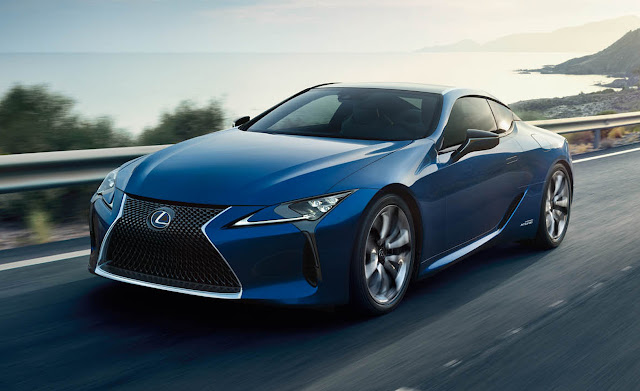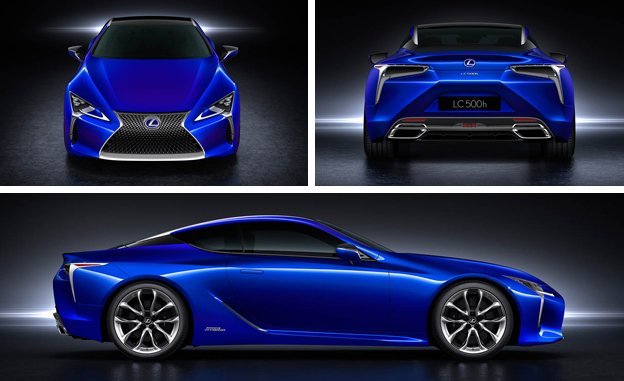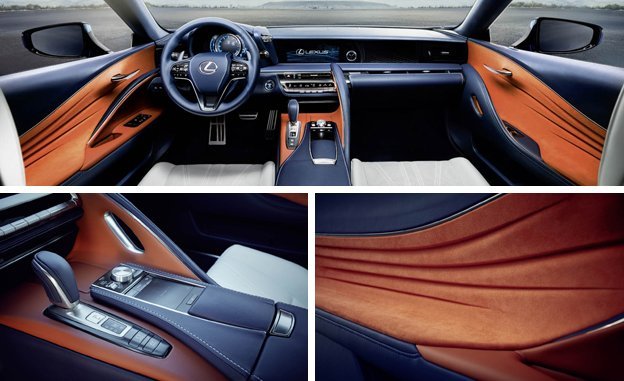Like it or not, the long-term future of cars almost definitely doesn’t involve the internal combustion of fossil fuels. Toyota is keenly aware of this truth, and that’s why the brand is readying a fuel-cell car for its premium Lexus brand by 2020. But that model won’t represent Toyota’s first major foray into hydrogen-fuel-cell powered vehicles, as the brand became the first to offer a fuel-cell car for direct purchase last year, in the form of the, er, aesthetically challenged Mirai. But before fuel-cell-powered and battery-electric vehicles rule the autonomous roads of the future, the interim will be filled with lots and lots of hybrids.
It’s been just over a month since the company revealed the stunning LC500, a V-8 two-door that the company hopes will help revitalize the somewhat moribund upscale-coupe market when it goes on sale in about a year as a 2018 model. Now, hot on the heels of that gasoline-powered model comes the hybrid variant, the LC500h, which will launch concurrently with the plain ol’ 500. But the LC500h is much more than just another hybrid from the automaker that sells a million gas-electric cars each year.
The Proof Is in the Transmissions—Yep, Two of ’Em
Indeed, the new LC hybrid marks the debut of a new longitudinal hybrid transmission, which Toyota has dubbed the Multi Stage Hybrid System. This system includes a CVT that incorporates two electric motors—similar in concept to the Hybrid Synergy Drive in a Prius—and adds a conventional four-speed automatic transmission to the mix. Yes, it has two transmissions. If you’re thinking that this sounds a lot like the GM/BMW/Daimler-Chrysler co-developed Two-Mode hybrid transmission from a decade ago, you’re not far off the mark.
In a sense, Multi Stage picks up where Two-Mode left off, and adds quite a bit of capability in the process. Chief engineer Koji Sato says one of the main goals was to eliminate the rubber-band feel of a traditional CVT, and to make throttle inputs feel more directly related to what the car is actually doing. No car company, certainly not one as renowned for refinement as Lexus, wants its new model compared to a golf cart.
That said, Lexus admits the LC500h will feel a lot like hybrids with only a conventional CVT when driven in its Normal or Eco modes, albeit with fewer engine-rev spikes that feel out of step with acceleration. The transmission arrangement puts the four-speed effectively at the output of the two-motor CVT, which means the electric motors don’t have to spin as fast, reducing electrical losses and thereby improving efficiency. The new setup also allows for electric-only driving up to 87 mph; the old transmission, as installed in the LS600h and GS450hhybrids, would only allow for 62 mph. (For further reference, the Two-Mode system was capable of 32 mph.) But put the LC500h in Sport or Sport+ mode, and the transmission acts like a conventional 10-speed transmission—the number of ratios in the regular LC500’s gearbox—using “virtual gears.” We’ll have a deep dive story with all the juicy details on Multi Stage soon.
More Details to Detail
At the technical preview we attended, Sato wasn’t quite ready to reveal how much the LC500h weighs, but he did tell us the regular LC should weigh about the same as the BMW 6-series. So taking into account the extra 150 pounds or so added by the lithium-ion battery pack and associated electronics, the hybrid LC should weigh roughly 4400 pounds.
While Lexus says the 467-hp V-8 coupe will hit 60 mph in “less than 4.5 seconds,” the hybrid will pack significantly less horsepower—113 fewer, to be exact—and so we’re thinking that Lexus’s sub-five-second 0-to-60-mph time for the 500h might be a bit optimistic. The internal-combustion portion of the powertrain is an Atkinson-cycle 3.5-liter V-6 rated at 295 horsepower and 348 lb-ft of torque; the remaining 59 horses come courtesy of the larger electric motor/generator in the Multi Stage transmission. However, we’re prepared to be proven wrong about the LC500h’s accelerative might—after all, Lexus says this is the first hybrid it has made that’s capable of spinning its rear tires on dry asphalt. As for efficiency, Lexus is holding the LC500h’s fuel-economy numbers close to its chest, as EPA scrutinizing is still some ways in the future. We figure you can expect minimum city and highway scores of 31 and 37 mpg, however, and 40 mpg on the highway isn’t out of the question.
Aside from the powertrain changes, indicators that this is a hybrid are few, the most obvious being a few badges and a slightly reworked shifter that mimics the Prius’s funky over-and-up/down gate. Indeed, the LC500h shares the LC500’s wheels and tires, sheetmetal, and interior. This is no bad thing. The LC is a gorgeous thing to behold, a taut mix of elegance and aggression, while the three-tone blue, orange, and white interior in the LC500h we saw—a nod to Virginia Cavaliers fans, perhaps?—is subtler and more successful than one might think. And the attention paid to creating interesting details, such as the flowing, asymmetrically designed interior door panels with their frameless pulls, provide further proof that Lexus is taking design seriously. In person, this car seems to signal a shift at Lexus to a more considered aesthetic—outside of the massive grille, that is—and we love it. As we viewed the car, we kept thinking of the LC as a 1960s Japanese sports coupe remixed for the 21st century with big wheels, an angry countenance, and a wider stance.
We’re going to have to wait more than a year to drive this car, and many of the equipment and technology details we’d normally share in an introductory story like this are still under wraps. That said, the LC500 and LC500h will certainly have all the safety, luxury, and convenience features expected in statement vehicles with a price tags expected to approach—or surpass—$100,000.
Between the Lexus LC, the new Infiniti Q60, the S-class coupe, and the stalwart BMW 6-series, the big-coupe segment may be on the verge of a renaissance. Aside from knocking it out of the park stylistically, the Lexus also is the only one to offer a hybrid version. We’re not sure we’ll ever see a bigger fight over such small sales volumes—and we can’t wait.











0 commentaires:
Enregistrer un commentaire